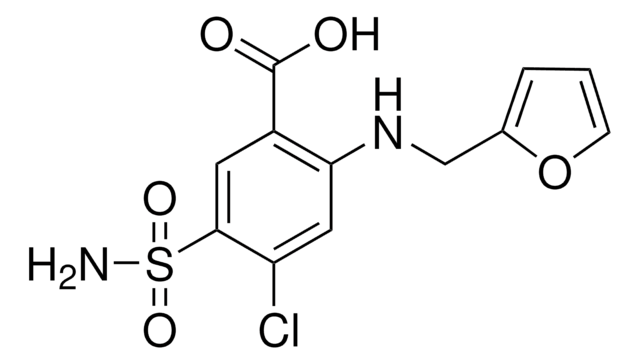D5765
Denatonium benzoate
≥98%
Synonym(s):
N,N-Diethyl-N-[(2,6-dimethylphenylcarbamoyl)methyl]benzylammonium benzoate, Benzyldiethyl(2,6-xylylcarbamoylmethyl)ammonium benzoate, THS 839
About This Item
Recommended Products
Quality Level
Assay
≥98%
form
powder
mp
164-168 °C (lit.)
SMILES string
[O-]C(=O)c1ccccc1.CC[N+](CC)(CC(=O)Nc2c(C)cccc2C)Cc3ccccc3
InChI
1S/C21H28N2O.C7H6O2/c1-5-23(6-2,15-19-13-8-7-9-14-19)16-20(24)22-21-17(3)11-10-12-18(21)4;8-7(9)6-4-2-1-3-5-6/h7-14H,5-6,15-16H2,1-4H3;1-5H,(H,8,9)
InChI key
VWTINHYPRWEBQY-UHFFFAOYSA-N
Looking for similar products? Visit Product Comparison Guide
General description
Application
- To prepare anti-gnawing bio-polymer composites using zinc stearate (ZnSt) and capsicum oleoresin (CO) impregnated in silica (SiCO) and polybutylene succinate(PBS).
Signal Word
Danger
Hazard Statements
Precautionary Statements
Hazard Classifications
Acute Tox. 2 Inhalation - Acute Tox. 4 Oral - Eye Dam. 1
Storage Class Code
6.1A - Combustible acute toxic Cat. 1 and 2 / very toxic hazardous materials
WGK
WGK 2
Flash Point(F)
212.0 °F - closed cup
Flash Point(C)
100 °C - closed cup
Personal Protective Equipment
Regulatory Listings
Regulatory Listings are mainly provided for chemical products. Only limited information can be provided here for non-chemical products. No entry means none of the components are listed. It is the user’s obligation to ensure the safe and legal use of the product.
JAN Code
D5765-BULK:
D5765-VAR:
D5765-5G:
D5765-10G:
D5765-1G:
Choose from one of the most recent versions:
Already Own This Product?
Find documentation for the products that you have recently purchased in the Document Library.
Customers Also Viewed
Our team of scientists has experience in all areas of research including Life Science, Material Science, Chemical Synthesis, Chromatography, Analytical and many others.
Contact Technical Service











